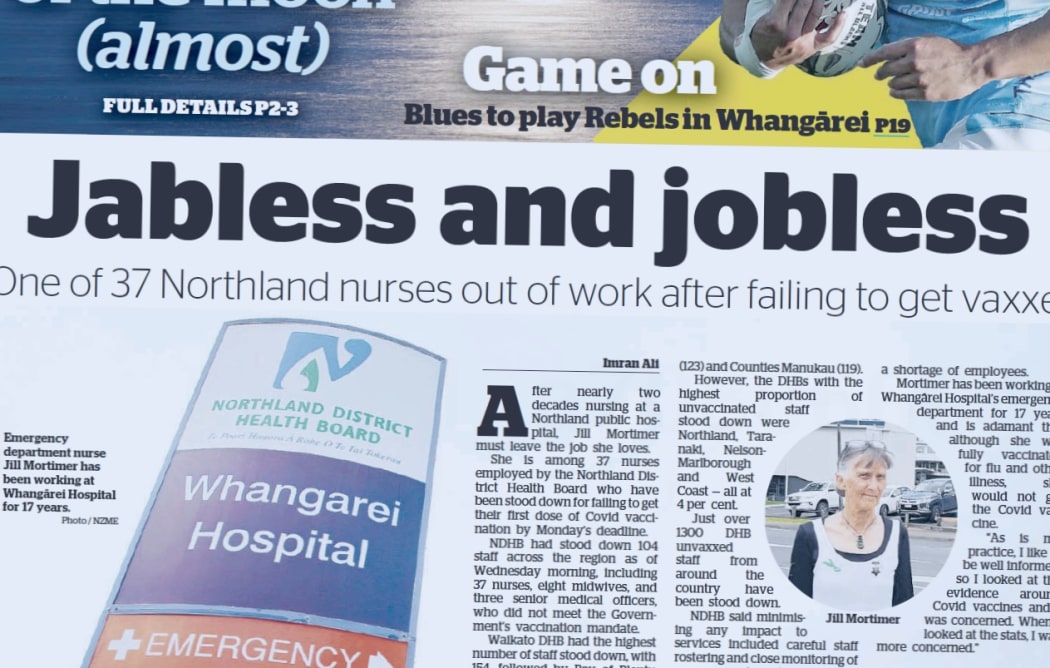Analysis: News organisations have devoted plenty of space to the unvaccinated healthcare and education workers being stood down this week. But many of those stories are missing vital context.

The front page of the Northern Advocate newspaper today. Photo: RNZ Mediawatch
Around 1300 DHB staff and an estimated 700 teachers have been stood down this week after failing to comply with the government’s vaccine mandate.
Though that represents around 1.5 percent and 1 percent of the public health and education workforces respectively, the comparatively small ranks of the unvaccinated have punched above their weight in generating news headlines.
Stuff has run stories on Richmond early childhood teacher Katrina McNamara, Christchurch mental health nurse Megan McNamara, Lake Hāwea early childhood teacher Kimberley Skiller, Marlborough nurse Sandra Stubbs, and South Canterbury school teacher Rachael Mortimer. NZME has covered Hastings teacher aide Karen Spurgeon and Northland nurse Jill Mortimer.
Many of these stories are sprinkled with sympathetic language.
Stuff’s story on Stubbs describes her as having “lost her career”, and quotes her husband saying she’s been “forced” to leave her job.
Its story on Megan McNamara begins with the news that she “sent a goodbye email to her team and cried as she rode away from her job for the last time”.
Over at NZME, the Northern Advocate's story on Jill Mortimer says she's in "in the unenviable position of leaving the job she loves".
Reading the accounts you’d almost believe these workers’ employment has been put at risk unfairly and arbitrarily.
Some of the stories give no explanation for the reasons behind the vaccine mandate.
One of the more fulsome entries comes from the Herald, which devotes two paragraphs to Chris Hipkins' assertion that the requirement is about “leaving nothing to chance”. The Advocate gives space to a defence of the vaccine from Auckland University vaccinologist Associate Professor Helen Petousis-Harris, but only as a rebuttal to several paragraphs of misinformation.
In reality, these staff aren’t being forced out of their jobs. They can stay employed if they get a safe, effective, rigorously studied vaccine that’s available at most GP offices or pharmacies.
Whatever they say about their motives, they’re being stood down for not fulfilling their duty to protect the vulnerable people in their care.
Some research indicates unvaccinated people are roughly 20 times more likely to pass on Covid, mainly because they’re more likely to catch it and their cases are usually more severe.
Unvaccinated nurses, midwives, and teachers are at greater risk of infecting pupils, patients and newborn babies.
Those facts go unmentioned in many of the stories on the staff refusing to comply with the mandate.
Instead they allow space for those workers to argue their freedoms.
Katrina McNamara is quoted decrying the animosity shown over “what should be someone’s personal choice.”
Megan McNamara talks about not being given her “right to say no”.
There’s little mention of the right of sick and immunocompromised people to be protected from potentially deadly breakthrough Covid-19 infections; silence on the freedom of students and babies to not be exposed to the virus.
Reporters may think that the reasons for the mandate are self-evident, or that other coverage is sufficient in explaining the benefits of the Covid-19 vaccine.
But social media is riddled with vaccine misinformation. Thousands of people recently marched on Parliament to advocate for the unhindered spread of Covid-19.
It needs to be repeated: vaccines reduce people's chance of catching Covid-19. The entire reason the vaccine mandates exist is to reduce infection risk for vulnerable people.
Those people should at least get a mention in the stories about the measures we’re implementing in their name.
Instead they’re too often invisible.


